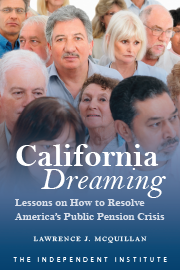There’s a plot playing out in Illinois—hike income taxes, increase spending, then impose a progressive income tax to “solve” persistent budget deficits. As an economist who analyzed California policy for 15 years, I saw firsthand the harm caused by the progressive tax. Illinois should soundly reject it.
California is the poster child for punishing success. The Golden State taxes personal income at seven increasingly-higher rates including a top rate of 10.3 percent, second-highest nationally. There’s even talk of increasing the top rate to 13.3 percent.
California’s second-highest rate of 9.3 percent kicks in at only $48,000 for single taxpayers. It used to be $838,000, adjusted for inflation, when California’s income tax began. This is how progressivity works—it starts with Paris Hilton and comes after everyone else later by creeping down the income ladder.
This punitive tax has forced motivated and entrepreneurial people at all income levels to flee California, taking their money with them. Data from the economic research and consulting firm Laffer Associates show that from 1981 to 2005, hikes in California’s top income-tax rate overlapped almost perfectly with periods of flight from the state, while cuts in the top rate brought people back. Illinois already has lost a net of 1.2 million people since 1991, costing Illinois $1.8 billion of income annually. A progressive tax in Illinois would drive even more people away.
Supporters claim a progressive tax is “more fair,” and makes the rich pay their “fair share.” But that’s already happening in Illinois.
Currently, Illinoisans with an annual base income higher than $1 million pay an average tax 47 times higher than the typical resident, according to the Center for Tax and Budget Accountability. Everyone pays the same rate, and the rich pay more because they have higher incomes. That’s fair.
But in California, the tax code discriminates. The average state income tax bill for people who earn more than $1 million a year is $278,000. The average Californian pays just $2,648, meaning high-earners pay about 105 times more taxes than the average tax-paying Californian, and at rates up to 10 times higher.
An even bigger group of people are asked to pay little or no taxes. As a result, many demand ever-larger state spending since they don’t shoulder the cost and help increase deficits. This lopsided California tax system is fundamentally unfair and distortionary.
A progressive income tax also exaggerates booms and busts in state revenue. During good times, revenue surges because incomes increase and people are pushed into higher tax brackets. Flush with cash, lawmakers establish new permanent programs. When the inevitable downturn occurs, the process reverses. Revenue dips are magnified and deficits explode. Poor people dependent on government programs often are first to be harmed by belt-tightening, hardly a model of fairness.
This “revenue roller coaster” is pronounced in California—it has the fourth most volatile income-tax receipts nationally. Census data show California’s tax revenues rise more quickly during good times, and fall more severely during bad times. This volatility, now conceded by California Gov. Jerry Brown, makes accurate state budgeting impossible because peaks, troughs and turning points are impossible to predict.
California is the canary in the coal mine. Its progressive tax contributes to budget deficits, makes tax receipts more volatile and accurate budgeting impossible, and punishes success — driving people away. Illinois shouldn’t invite such grief.









